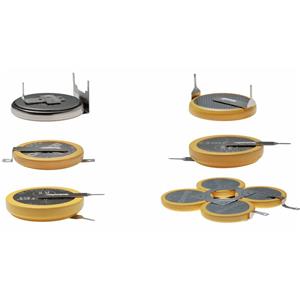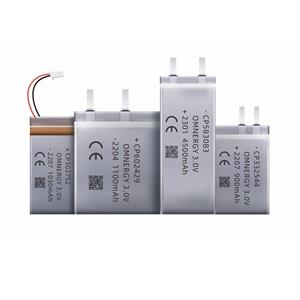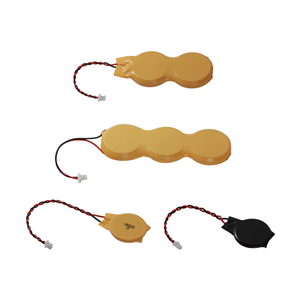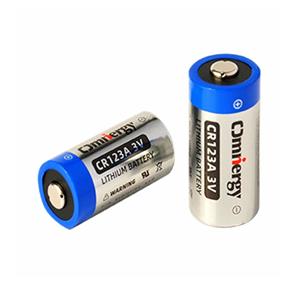-
Power solutions specifically designed for critical modules in smart vehicles, driving breakthroughs in both safety and performance for the industry. Power Glory designs high-performance miniature battery solutions for automotive intelligent applications. It has overcome the technical bottlenecks of traditional miniature power sources in terms of low-temperature starting, high-temperature resistance, and ultra-long lifespan, providing the "power heart" for dozens of key modules in intelligent vehicles, such as sensor modules, TPMS (tire pressure monitoring systems), smart keys, and in-vehicle ETC systems, becoming a crucial technological foundation for the safe and reliable operation of intelligent vehicles.
-
Power Glory's miniature battery product line covers various types, including lithium-manganese button batteries, lithium-manganese cylindrical batteries, and lithium-manganese soft-pack batteries.
-
The lithium-manganese pouch battery is comprehensively optimized for space-constrained environments. Utilizing an ultra-thin laminated structure and a customized form factor, it perfectly adapts to the internal space constraints of wearable devices. Unlike traditional metal-cased batteries, the lithium-manganese pouch battery uses flexible packaging materials, such as aluminum-plastic film, instead of a rigid metal casing, significantly improving its adaptability. These innovations allow the battery to adjust its shape according to the internal space of the device, maximizing the use of every millimeter of space. This miniaturization technology frees up valuable space within wearable devices.
-
2312-2025
Refusing to Compromise: The Self-Cultivation of a Qualified Automotive Electronic Key Battery
Hello everyone, I am a car electronic key battery from Power Glory. In your grand human narratives, I might just be "a component," "a consumable," or even a "little gadget" added to an online shopping order for free shipping. But today, I want to prove myself, and the names of my millions of fellow batteries. We are far from ordinary. We lie dormant within that small key casing, shouldering the crucial responsibility of "responding instantly to a press, activating at the slightest touch." Our career is an epic of trust, responsibility, and the pursuit of excellence. And the starting point of all this is the "self-cultivation" of a qualified battery. This cultivation is not innate; it stems from a profound understanding of the four words "refusal to compromise."
-
Lithium-manganese batteries, with their unique chemical composition, possess a very wide operating temperature range, typically from -20°C to +70°C, with some special models even reaching -40°C to +85°C. Whether in the sweltering heat of summer or the frigid cold of winter, they can stably output energy, ensuring our cars are always ready to be called upon. This robust environmental adaptability is the foundation for ensuring driving safety and convenience. "Safe" Protection – Sealed Structure, Eliminating Worries Imagine a leaking battery corroding the circuit board of your car key, worth hundreds or even thousands of dollars – how frustrating would that be? Lithium-manganese batteries are exemplary in this regard. Their fully sealed structure fundamentally eliminates the possibility of leakage. Furthermore, their chemical system is highly stable, free of heavy metals like lead, mercury, and cadmium, making them more environmentally friendly. More importantly, they boast high energy density. Within the same size and weight, they can store more electrical energy. Therefore, a single small, button-sized CR2032 battery can power a remote key for years, perfectly achieving the miniaturization and thinning of the key design. Safety, environmental friendliness, high energy, and compactness – these combined characteristics make lithium-manganese batteries the ideal choice for power supplies embedded in sophisticated electronic devices. Power Glory's Tip: Next time you lightly press the key and hear that crisp "beep" as the car door opens, give that little CR2032 battery a mental thumbs up. It's not just an ordinary button battery; it's an energy core embodying four key strengths: stability, resilience, strength, and safety. Its existence perfectly embodies the idea that "the best technology is the kind you don't even feel." Power Glory products work silently, day in and day out, providing unwavering performance to safeguard the unspoken connection between you and your vehicle.
-
With smart devices ubiquitous today, making IoT devices more power-efficient and longer-lasting has become a challenge every engineer must face. The rapid development of the Internet of Things (IoT) has connected billions of devices to the internet, many of which rely on disposable batteries for years or even decades. In these applications, lithium-manganese button batteries have become the preferred power source due to their compact size, stable voltage, and long life.
-
Smart livestock applications, such as pedometers and Bluetooth ear tags, place particular emphasis on battery selection to ensure long-term stable operation and compact size. Overall, coin cell batteries offer a compact size, excellent sealing, easy replacement, and mature technology. They are often paired with ultra-low power consumption designs, making them a popular choice for a wide range of smart livestock applications.
-
From August 27th to 29th, 2025, the 24th International Internet of Things Exhibition (IOTE 2025) Shenzhen Station successfully concluded at the Shenzhen International Convention and Exhibition Center (Bao'an). As the world's largest one-stop "AI+IoT" full industry chain event, this exhibition focused on the deep integration and cross-border innovation of artificial intelligence and Internet of Things technologies, aiming to promote the improvement and development of the "data perception-intelligent decision-making-scenario implementation" ecosystem.
-
2008-2025
Assisting Night Vision Device Applications | Promoting the Development of Smart Military Instruments
Military night vision goggles exemplify high-tech empowerment of individual combat and are essential equipment for modern militaries. They significantly enhance soldiers' situational awareness, mobility, and combat capabilities in darkness or low-light environments. They have revolutionized nighttime combat and are crucial for modern militaries to gain information advantage and initiative on the battlefield.
-
A pacemaker is a small electronic medical device implanted in the body, primarily used to treat a slow heartbeat (bradycardia). Its core function is to monitor the heart's own electrical activity and, if the heart beats too slowly or stops, send weak electrical pulses to stimulate the heart muscle, causing it to contract at a normal rate and thus ensuring adequate blood supply to the body. The design of these batteries must meet the stringent requirements of implantable medical devices for long life, high safety, and stable voltage.




